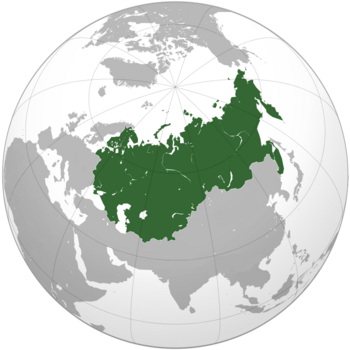Pavlovsk: Difference between revisions
No edit summary |
|||
| Line 123: | Line 123: | ||
===Government=== | ===Government=== | ||
The General Secretary is the titular head of state, elected by the National People's Congress. The Premier is appointed by the General Secretary and approved by the National People's Congress, and serves the head of government, presiding over the State Committee composed of four vice premiers and the heads of ministries and the "Group of Governmental Experts". The incumbent General Secretary is Mikhail | The General Secretary is the titular head of state, elected by the National People's Congress. The Premier is appointed by the General Secretary and approved by the National People's Congress, and serves the head of government, presiding over the State Committee composed of four vice premiers and the heads of ministries and the "Group of Governmental Experts". The incumbent General Secretary is Mikhail Gorbachad. The incumbent premier is Nikolai Lermontod. | ||
Since Mikhail Gorbachad took office in 1985, there have been some moves toward political liberalization within Pavlovsk, in that open contested mayoral and council elections are now held at the town and city levels, with little to no party oversight. However, the party retains effective control over higher government appointments, as candidates for election in the Worker's Councils must be approved by the party. However, requirements for party approval have been eased significantly since 1985. | Since Mikhail Gorbachad took office in 1985, there have been some moves toward political liberalization within Pavlovsk, in that open contested mayoral and council elections are now held at the town and city levels, with little to no party oversight. However, the party retains effective control over higher government appointments, as candidates for election in the Worker's Councils must be approved by the party. However, requirements for party approval have been eased significantly since 1985. | ||
Revision as of 22:17, 23 April 2019
Federated People's Republic of Pavlovsk Федеративная Народная Республика Па́вловск | |
|---|---|
|
Flag | |
| Motto: "Бережливость хороша, да скупость страшна." (Pavlovski) ("Economy is Good, Greed is Bad" or "Economy is a good servant, but a bad master.") | |
 | |
| Capital | Chekhov |
| Official languages | Pavlovski, Kazakh, Finnish |
| Recognised national languages | Pavlovski, Kazakh, Finnish, Uzbek, Georgian, Azerbaijani, Latvian, Kyrgyz, Tajik, Armenian, Estonian |
| Ethnic groups |
|
| Demonym(s) | Pavlovski |
| Government | Unitary One-Party Socialist Republic |
| Legislature | National People's Congress |
| Formation | |
• Crowning of Truvor | 862 |
• Establishment of Pavlov' | 880 |
• 1300 | Duchy of Chekhov |
• Tsardom of Pavlovsk | 1547 |
• Empire of Pavlovsk | 1721 |
• People's Federated Republic of Pavlovsk | 19 October 1917 |
| Population | |
• Estimate | 316,730,819 (3rd) |
| GDP (nominal) | estimate |
• Total | USD 1,925.67 Bn |
| Currency | Ruble (RUB) |
| Time zone | UTC +2 to +12 |
| Driving side | right |
| Calling code | +669 |
Pavlovsk, officially the Federated People's Republic of Pavlovsk (Pavlovski: Федеративная Народная Республика Па́вловск Romanization: Federativnaya Narodnaya Respublika Pávlovsk), is a transcontinental country spanning Eastern Europe and Northern Asia. From north-west to south-east, the nation is directly bordered by Sundsvall, Lubilia, Carpathia, Oghuz, Samarra, the Afghan Republic, the Persian Sultanate, the Steppe Confederacy, Turan, Songjiang, and the Joseon Empire. It shares maritime borders with Japan at the Tartar Strait, and with the Niagara Union at the Bering Strait. Pavlovsk is the largest country in the world by area, covering over one-eighth the world's inhabited land area, and spanning eleven time zones.
Politics
The constitution of Pavlovsk states that the Federated People's Republic of Pavlovsk is "a united socialist state under the leadership of the working class and based on the alliance of workers", and that the state will "apply the principles of communism as it sees fit." Historically, different eras of leadership have implemented the "principles of communism" in vastly different ways. Its current political, ideological and economic system is that of "Rykovian Socialism", which has been termed by its advocates as "reformed socialism", "socialism with democratic characteristics", a "socialist market economy", and a "market economy which pursues communist ideals".
Communist Party
The Constitution of Pavlovsk designates the Communist Party of Pavlovsk (CPP) as the ruling party of Pavlovsk. The party has a pyramidal structure, with the highest authority over the state and government being vested in the General Secretary. The General Secretary is indirectly elected by National People's Congress every five years, and can be removed from office at any other time by the National People's Congress via a unanimous vote. The National People's Congress is made up of 100 representatives who are indirectly elected by the Worker's Councils of the nine Federal Republics. The Worker's Councils are directly elected by the citizens of their respective Federal Republics.
Government
The General Secretary is the titular head of state, elected by the National People's Congress. The Premier is appointed by the General Secretary and approved by the National People's Congress, and serves the head of government, presiding over the State Committee composed of four vice premiers and the heads of ministries and the "Group of Governmental Experts". The incumbent General Secretary is Mikhail Gorbachad. The incumbent premier is Nikolai Lermontod.
Since Mikhail Gorbachad took office in 1985, there have been some moves toward political liberalization within Pavlovsk, in that open contested mayoral and council elections are now held at the town and city levels, with little to no party oversight. However, the party retains effective control over higher government appointments, as candidates for election in the Worker's Councils must be approved by the party. However, requirements for party approval have been eased significantly since 1985.
Foreign relations
History
Geography
Climate
Environment
Economy
Energy
Industry
Infrastructure
Transport
Demographics
Education
Religion
Culture
Music and art
Cuisine
Sports
This article is from APSIA 1.2. For the most recent iteration of APSIA, look at Category:APSIA 2.B |

